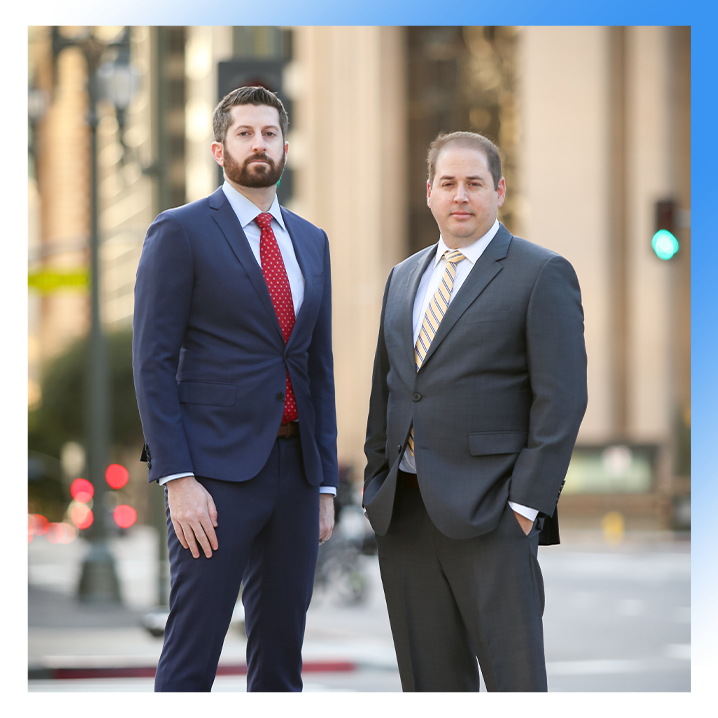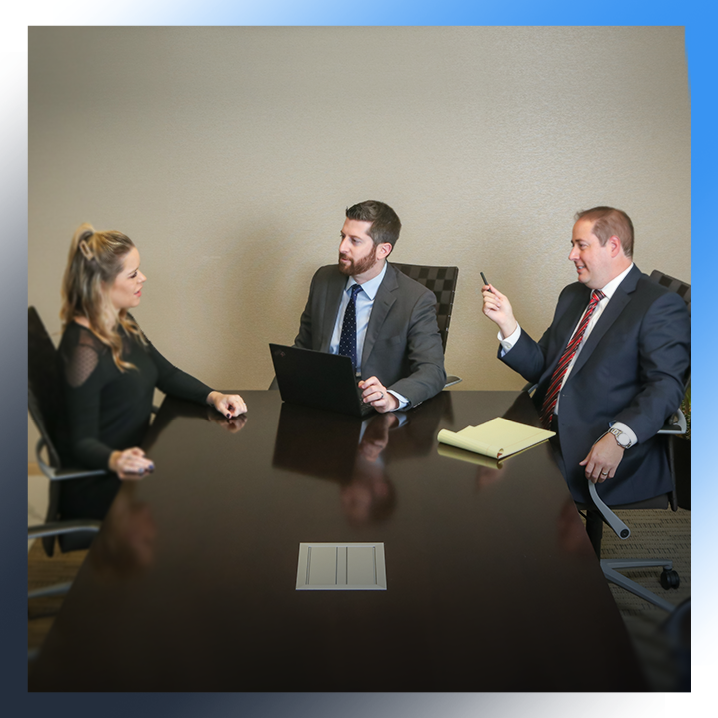
Leave of Absence & FMLA Attorneys in Pasadena, California
As a California employee, you may be entitled to an extended period of time off work if you or a loved one are sick or injured. Such a prolonged absence from work is commonly called a “leave of absence.” A leave of absence may be afforded if you need time to recuperate, care for a loved one, bond with a new baby, or deal with other extraordinary circumstances that warrant time off work.
Several California leave of absense laws protect your right to take specific paid and unpaid leave. If you believe your employer has violated your rights, a leave of absence lawyer from Domb Rauchwerger LLP can help you take legal action against them.
Connect with us via our online contact form or call (213) 772-5882 to schedule a free consultation with a Pasadena leave of absence lawyer. Se habla Español.
Leave of Absence Laws Protecting California Employees
The Family and Medical Leave Act (FMLA) is a federal law that provides certain employees up to 12 weeks of unpaid, job-protected leave per year. It also requires that group health benefits be maintained during the leave.
Eligibility Criteria for FMLA Leave
- Have worked for the employer for at least 12 months
- Have at least 1,250 hours of service for the employer during the 12 months immediately preceding the leave
- Work at a location where the employer has at least 50 employees within 75 miles
The California Family Rights Act (CFRA) is similar to FMLA but has some key differences. While both laws provide protected leave for specific medical and family reasons, CFRA covers more family members (including domestic partners and their children) and does not cover pregnancy-related disabilities. However, pregnancy disability is protected under a separate California law, the Pregnancy Disability Leave Law (PDL), which works in concert with CFRA.
The eligibility requirements for CFRA leave are similar to those for FMLA leave.
Reasons You Can Take Leave Under FMLA and CFRA
- A “serious health condition” (explained below)
- To provide care for a child, grandchild, parent, grandparent, sibling, spouse, domestic partner, or designated person (defined as “any person related by blood or whose association with the employee is the equivalent of a family relationship”) who suffers from a “serious health condition”
- The birth of your child or having a child placed with you for adoption or foster care
- For a qualifying exigency related to the covered active duty or call to covered active duty of your spouse, domestic partner, child, or parent in the U.S. military
Knowing When to Seek Legal Help for FMLA Violations
It's crucial to seek legal help if you believe your FMLA rights have been violated. Some common violations include denying eligible employees FMLA leave, retaliating against employees for using FMLA leave, or not restoring an employee to their original or equivalent position after their FMLA leave.
An employment lawyer can review your situation, help you understand your rights, and guide you through filing a complaint or lawsuit. Legal assistance is vital when faced with complex litigation, as professional representation can significantly enhance your chances of a positive outcome.
Searching for FMLA or CFRA attorneys near you? Get in touch with Domb Rauchwerger LLP at (213) 772-5882 or complete our online form for a free consultation. Our services are available in English and Spanish.
Don't face legal challenges alone. Contact us at (213) 772-5882 to discuss your case with our experienced attorneys.

What Qualifies As a Serious Health Condition for a Leave of Absence?
The phrase “serious health condition” is an illness, injury, impairment, or physical or mental condition involving inpatient care or continuing treatment. However, under the CFRA, disabilities caused by pregnancy or childbirth are not considered serious health conditions. Instead, those conditions are protected under separate leave of absence laws.
If you take CFRA leave for a qualifying reason, you can be reinstated to the same or equivalent job when your leave ends. While CFRA leave is unpaid, you can still receive compensation while out on CFRA leave if you have sick time, PTO, or vacation time.
Notifying Your Employer for Leaves of Absence
If you need to take leave for a reason covered by the CFRA, you must notify your employer. That said, you don’t need to reference the CFRA specifically, as it’s your employer’s responsibility to know whether the CFRA covers the reason you need to take leave.
You should also provide reasonable advance notice to your employer if you know ahead of time that you’ll need to take leave. You should estimate the time and duration of the leave and supporting medical documentation.
You’re not required to provide, nor should your employer ask for, the medical condition causing you to take leave.
If you believe your employer is violating your rights under the CFRA, a leave of absence lawyer from our team can help you pursue remedies. We can also help you take legal action if your employer discriminates, harasses, or retaliates against you for requesting CFRA-protected leave.
Speak with an experienced leave of absence lawyer in Pasadena from Domb Rauchwerger LLP when you schedule a free initial consultation. Complete an online form or call (213) 772-5882. We speak English and Spanish.
Pregnancy Disability Leave
According to the Pregnancy Disability Leave Law (PDLL), you’re entitled to four months of unpaid leave if you work for an employer with at least five employees and need to take time off for one of the following reasons:
- Pregnancy
- The birth of a child
- A pregnancy-related disability
While PDLL leave is unpaid, you may receive payment for some of the time you take off through sick pay, vacation pay, or California State Disability Insurance. In addition, while on PDLL leave, your employer has to maintain and pay for your health coverage just as it would have if you had not taken PDLL leave and continued employment.
If you’re eligible to take pregnancy leave, you can take 12 weeks of CFRA leave after taking four months of PDLL, allowing you to take seven months of protected time for the birth of a child. Additional leave beyond seven months may be possible as an additional reasonable accommodation under the Fair Employment and Housing Act (FEHA).
You Have the Right to Return to Your Job After PDLL Leave
According to the law, you must be reinstated to the same position after the conclusion of your PDLL leave unless the position is no longer available for reasons unrelated to your leave.
An employer may also deny you your old position if holding the position open would have substantially undermined the safety or operation of the employer’s business. If the employer attempts to rely on this justification, the employee must still be reinstated to a comparable position.
Reasonable Accommodation Leave
Under the FEHA, your employer must provide reasonable accommodations to you if you have a disability and need accommodations, such as modifications to your work environment to perform essential functions of your job.
If you need to take time off to recover from a disability or injury, you could receive such accommodation as a finite leave of absence. When you return to work, you’re still entitled to accommodations to help you perform essential duties.
Examples of reasonable accommodations can include a reduced work schedule, restrictions on carrying heavy objects or being provided with software or equipment to allow you to perform the essential functions of your job.
How Long Your Finite Leave of Absence Can Be
The amount of leave considered a reasonable and finite amount of time is determined on a case-by-case basis. Typically, leaves that last only a few weeks or months will be considered valid.
On the other hand, leaves that last longer than a year aren’t likely to be considered reasonable. Each situation must be analyzed individually, so there’s a chance your leave could exceed a year.
Have questions about California leave of absence law? Reach out to a Pasadena leave of absence lawyer at Domb Rauchwerger LLP. Call (213) 772-5882.
Taking Reasonable Accommodation Leave When You’ve Exhausted Other Types of Leave
If you need to take time off from work to recover from a disability or injury, but you’ve exhausted your CFRA leave (or your CFRA leave and PDLL leave combined), you may still be entitled to reasonable accommodation as a leave of absence.
As a result, you generally cannot be fired because you are out of CFRA leave and only need a few more weeks to recover from an injury or medical condition to return to work with or without reasonable accommodations.
If you’ve been fired or had your rights violated for requesting or taking protected disability leave, we encourage you to consult with an experienced leave-of-absence attorney at Domb Rauchwerger LLP and explore your legal options.
California Paid Sick Leave
Generally, once you’ve worked for your California employer for at least 30 days within one year, you are eligible for at least three paid sick days, or 24 hours, depending on how many hours per day you typically work. Certain counties or cities require employers to provide their employees with more paid sick days.
Paid sick days or hours can be used starting on your 90th day of employment for either the diagnosis, care, or treatment of an existing health condition or preventative care for:
- Yourself
- Your biological, adopted, or foster child
- Your biological, adopted, or foster parent
- Your spouse or domestic partner
- Your grandparents, grandchild, or sibling
- A designated person
Employer Distribution of Sick Leave
Your employer can front-load your sick time, giving you all three days at the beginning of each year, or they can have you accrue sick time at a rate not less than one hour of paid sick leave for every 30 hours worked.
If your employer uses the accrual method, they may cap the paid sick leave you can earn for six days or 48 hours.
They can also limit your use of paid sick leave to 24 hours or three days in a given year, even if you’ve accrued more than that amount. Again, certain counties or cities may provide additional paid sick leave days. Lastly, your employer is not required to pay you for unused sick time upon the end of your employment.
Other Types of Leave
Depending on the size of your employer, California law may offer numerous other types of protection in particular situations, including, but not limited to:
- Bereavement leave
- Jury duty leave
- Military leave
- Leave for a victim of crime or abuse
- Leave to testify as a witness
- Leave for school activities
- Leave to attend drug and alcohol rehabilitation
- Leave for volunteering as a firefighter, police officer, or emergency personnel
- Leave to vote
- Literacy education leave
- Organ and bone marrow donation leave
- Civil air patrol leave
- Vacation pay
While California law doesn’t require your employer to provide vacation time, they cannot maintain a policy that forces you to give up your vacation time if you don’t use it in a certain period. These “use it or lose it” vacation policies are prohibited in California.
Your employer can cap the amount of vacation time you can accrue. In addition, any vacation time you’ve accrued must be paid out upon your termination or resignation.
An experienced leave of absence lawyer can take legal action against your employer if they’ve forced you to forfeit vacation time or failed to pay out the unused time you accrued.
California Paid Family Leave Benefits
Paid Family Leave benefits (PFL) allow you up to eight weeks of compensation to let you bond with a young child within one year of birth or placement in your home or foster care. You can also receive PFL compensation if you have to take time off to care for a seriously ill grandparent, parent, spouse, domestic partner, child, grandchild, or sibling.
Finally, PFL can be used to compensate an employee in connection with the covered active duty or call to duty of an employee’s parents, spouse, domestic partner, or child. PFL is not a type of leave; it is only a method for employees to receive compensation that may be available when taking other types of leave.
PFL benefits are typically 60% or 70% of an employee’s wages, depending on how much the employee earned. PFL differs from disability insurance compensation, which cannot be received simultaneously.
To learn more about California leaves of absence, get in touch with Domb Rauchwerger LLP. A leave of absence lawyer from our firm is ready to answer your questions. Contact us or call (213) 772-5882.
Employer Liability for Illegal Actions
Employers may violate the rights afforded to you under the CFRA, FEHA, and other state laws regarding leaves of absence in several ways.
Fortunately, our firm can help you fight back against your employer if they commit one or more of the following violations:
- Denying a request for leave that you’re eligible to take
- Unlawfully changing your role upon your return to work
- Failing to provide the same or similar position when your leave ends
- Not paying for health insurance benefits while you’re on leave
- Retaliating or discriminating against you for taking protected leave
- Harassing you for taking leave
- Firing, demoting, or lowering your pay for taking leave
Situations in Which You Can Be Fired While on Leave
Unfortunately, certain circumstances allow your employer to discharge you while on leave. They may terminate your employment if you’re subject to a company-wide layoff or take leave that isn’t protected by California law.
In addition, if you’re one of your company’s 10% highest-paid employees, your employer can deny you reinstatement of your job when your leave ends, but only if your return would cause the company significant financial hardship.
Start a free consultation with a Pasadena medical leave of absence lawyer. Contact Domb Rauchwerger LLP online or call (213) 772-5882. Se habla Español.
Compensation in a Leave of Absence Violation Case
An attorney can pursue monetary and non-monetary remedies if your employer has violated your right to take a protected leave of absence.
If your case is successful, you could receive the following:
- Reinstatement
- Back pay (lost wages, benefits or other compensation)
- Front pay (future lost wages and benefits from a jjudgment date forward)
- Damages for pain and suffering, embarrassment, and humiliation
- Attorneys’ fees
- Damages for any injuries or losses you’ve suffered
- Punitive damages
Your employer may also be required to train supervisors and managers about the laws that protect California employees’ right to pregnancy, medical, disability, and other forms of leave.


What Makes Us Different
-
Former Defense AttorneysGain a unique advantage with our firsthand knowledge of how corporations and insurance companies operate.
-
Collaborative ApproachOur founders collaborate on every case. This dynamic approach enhances our ability to secure favorable outcomes for you.
-
Respected in the Legal CommunityOur esteemed reputation and well-established connections within the legal community set us apart.
-
Free ConsultationsTalk through all of your legal options during a free consultation.
-
Millions Recovered on Behalf of Our ClientsOur track record of successful outcomes demonstrates our proficiency and commitment to fighting for your rights.
-
Hablamos EspañolEmployment law help provided by a Spanish-speaking team.
We Have What It Takes to Fight Back Against Your Employer
Before founding Domb Rauchwerger LLP, attorneys Zack Domb and Devin Rauchwerger were partners at one of the largest employment defense firms in the nation. In their previous positions, they represented Fortune 500 employers and learned all the tactics that corporate attorneys use to protect companies against leave of absence violation and other claims.
We differ from other employment law firms because we have inside information regarding how employment defense attorneys and in-house counsel operate. As a result, we can use our unique experience and knowledge to file winning claims for employees.
Attorneys Zack Domb and Devin Rauchwerger collaborate on all the cases they handle, which means you’ll get the representation of two skilled lawyers when you work with our law firm on leave of absence and other employment law claims.
If your employer has violated your rights under state law, we’ll meet with you via a free consultation at a time that works for you.
During your consultation, one of our seasoned Pasadena leave of absence lawyers will ask you about your employer’s actions that violated California law and discuss your legal rights. We will work aggressively to get the desired results if you have grounds for a claim.
Contact us (213) 772-5882 today.
